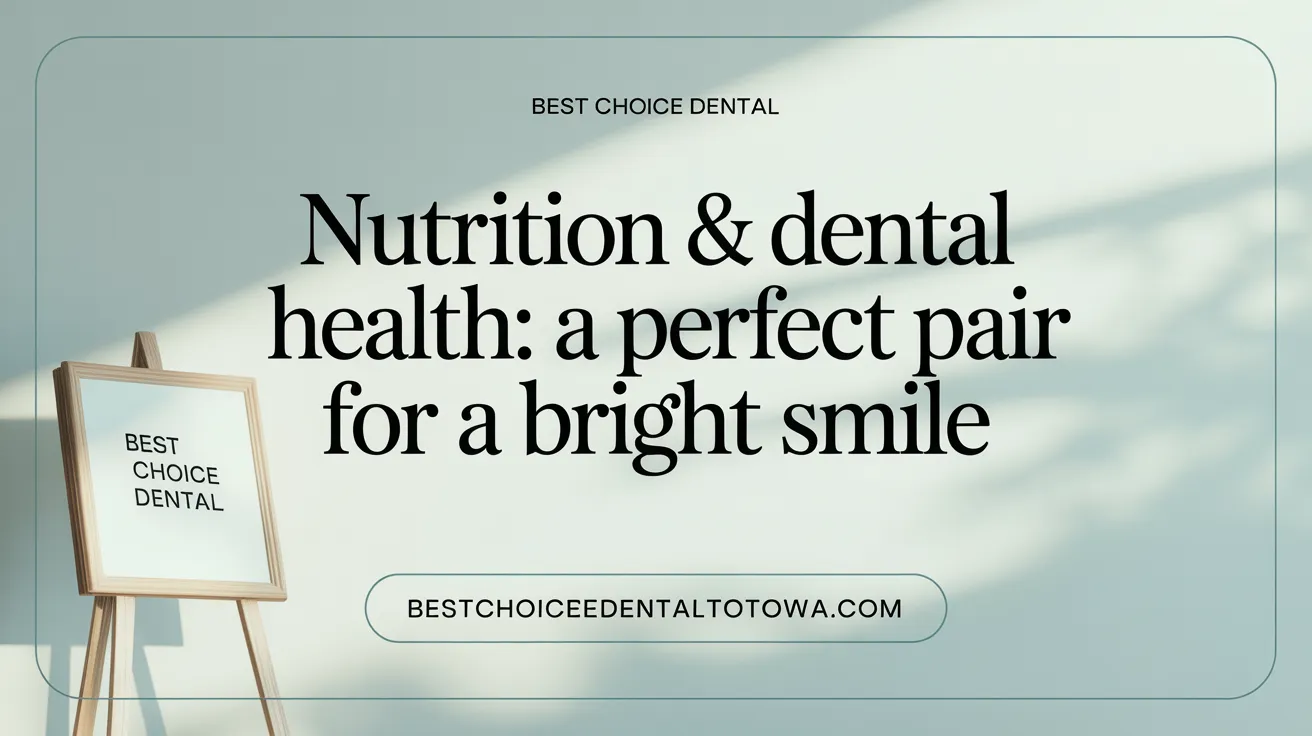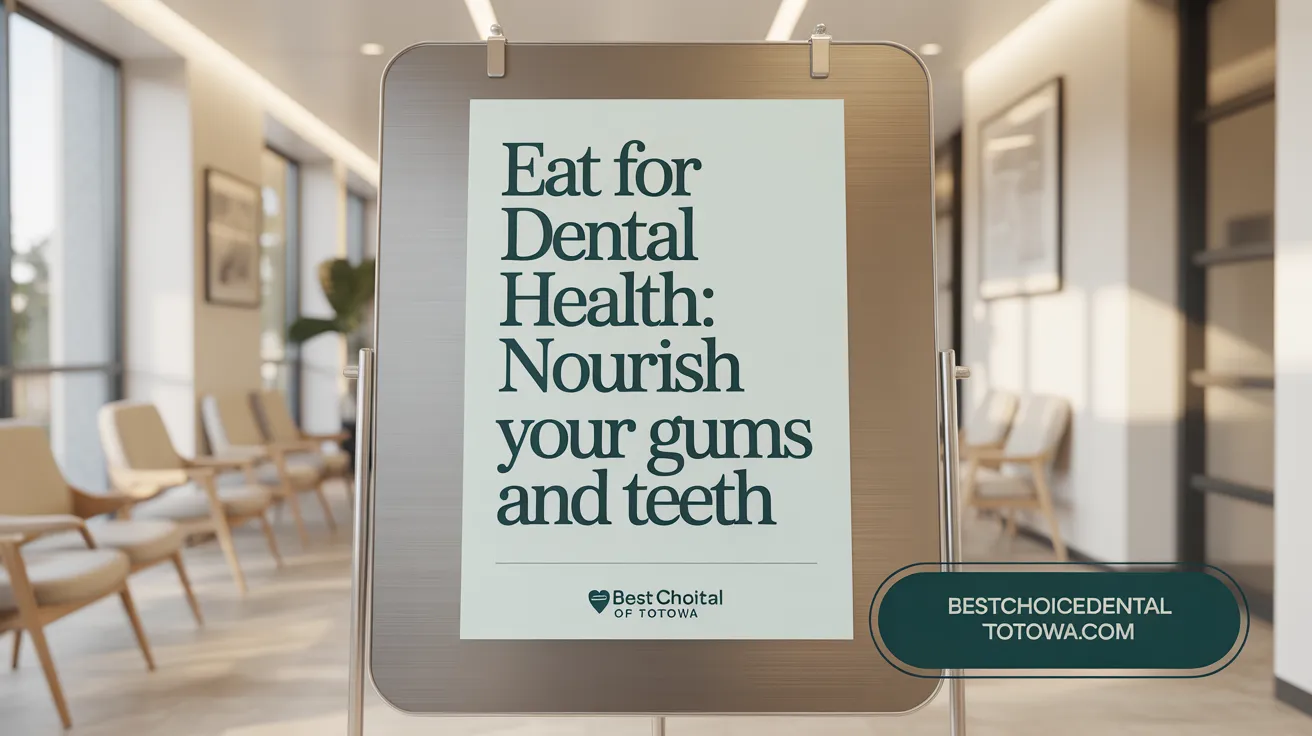Understanding the Critical Link Between Diet and Dental Health
Oral health is a mirror reflecting overall well-being, and nutrition plays a pivotal role in maintaining healthy teeth and gums for the entire family. From infancy through adulthood, dietary habits influence the risk of cavities, enamel erosion, and gum disease. This article delves into how balanced nutrition supports dental wellness, offering practical strategies and scientific insights to foster lifelong oral health.
The Interplay Between Nutrition and Dental Health

What is the relationship between nutrition and dental health?
Nutrition and dental health are deeply interconnected through a bidirectional relationship. A well-balanced diet rich in essential nutrients such as calcium, phosphorus, and vitamins D and C is vital for maintaining strong teeth and healthy gums. Calcium and phosphorus help rebuild and reinforce tooth enamel, while vitamins support tissue repair and immune function (Nutrition and dental health, Calcium and phosphorus for teeth, Calcium for Strong Teeth).
Good oral health enables proper chewing and digestion, which are essential for overall nutrition. Conversely, poor dental health can impair eating habits, leading to nutritional deficiencies that further weaken oral tissues (oral health and overall health, nutrition and oral health relationship).
High consumption of free sugars, especially sucrose and sugary beverages, significantly increases the risk of dental caries. These sugars feed harmful bacteria in plaque, which produce acids that demineralize enamel, leading to cavities. Foods with cariostatic properties, such as dairy products, crunchy fruits, and vegetables, can help protect against decay by neutralizing acids and promoting saliva flow (Impact of sugars on dental caries, Sugars causing tooth decay, Crunchy Fruits and Vegetables for Teeth Cleaning, Dairy products for dental health).
Dietary acids and frequent snacking on sweets or acidic drinks exacerbate dental erosion and decay by lowering the mouth's pH and prolonging acid contact with tooth surfaces. Adequate intake of minerals and vitamins can reduce susceptibility to periodontal disease and oral infections (Diet and Oral Health, Dietary acids and dental erosion, Balanced diet for oral health).
Pregnant women and children are especially vulnerable; ensuring proper nutrition supports fetal dental development and prevents early childhood caries (Child's nutrition and oral health, Nutrition and oral health, Oral health during pregnancy).
Overall, maintaining good nutrition is crucial not only for general health but also for preventing dental problems. A diet that emphasizes nutrient-dense foods while limiting added sugars and acids fosters a resilient, healthy oral environment (Nutrition and dental health, Diet and Nutrition to Prevent Dental Problems, Balanced diet for oral health).
Key Dietary Guidelines for Maintaining Healthy Teeth and Gums
 Maintaining healthy teeth and gums involves adopting dietary habits that supply essential nutrients and minimize damaging foods. A balanced diet rich in calcium and vitamin D supports the strength and repair of tooth enamel. Foods such as dairy products—including milk, cheese, and yogurt—are excellent sources of calcium, which helps rebuild lost minerals and protect teeth from decay (Nutrition and dental health, The Role of Nutrition in Family Dental Care, Diet and Oral Health).
Maintaining healthy teeth and gums involves adopting dietary habits that supply essential nutrients and minimize damaging foods. A balanced diet rich in calcium and vitamin D supports the strength and repair of tooth enamel. Foods such as dairy products—including milk, cheese, and yogurt—are excellent sources of calcium, which helps rebuild lost minerals and protect teeth from decay (Nutrition and dental health, The Role of Nutrition in Family Dental Care, Diet and Oral Health).
In addition to dairy, consuming a variety of fruits and vegetables, especially crunchy varieties like apples, carrots, and celery, stimulates saliva production. Saliva naturally neutralizes acids, washes away food particles, and provides a protective buffer against decay (Healthy nutrient-rich foods, Dental tips for National Nutrition Month, Best foods for your teeth).
Limiting the intake of free sugars—particularly sucrose—is crucial, as bacteria in dental plaque feed on sugars and produce acids that demineralize enamel. Reducing the frequency of sugar consumption, avoiding sweets outside mealtimes, and reading labels for hidden sugars help lower the risk of cavities (Nutrition and oral health relationship, Diet and Nutrition to Prevent Dental Problems, Tooth decay and sugar).
Apart from reducing sugar, limiting acidic foods and drinks, such as citrus fruits and sodas, protects enamel from erosion. When acidic foods are consumed, rinsing with water or waiting at least an hour before brushing can help prevent enamel wear (Diet and Oral Health, Tooth decay and sugar, Balanced diet for oral health).
Adequate hydration is another cornerstone of oral health. Drinking plenty of water, especially fluoridated water, maintains saliva flow, supports the mouth’s natural defenses, and helps neutralize acids. Fluoride in water and toothpaste further strengthens teeth against decay (Role of Nutrition in Family Dental Care, Oral Health and Nutrition, Nutrition and dental health).
Combining these dietary practices with good oral hygiene—brushing with fluoride toothpaste, flossing daily, and regular dental visits—creates a comprehensive approach to sustaining strong, healthy teeth and gums (Proper oral hygiene, Oral health and overall health, Nutrition and oral health relationship).
Beneficial and Harmful Foods and Nutrients for Dental Wellness
 A balanced diet plays a crucial role in maintaining healthy teeth and gums. Nutrients such as calcium, phosphorus, vitamin D, vitamin C, and fluoride are essential for strengthening enamel, supporting bone health, and promoting tissue repair. Foods high in calcium, like dairy products—including milk, cheese, and yogurt—help rebuild and mineralize tooth enamel (Calcium's Role in Dental Health, Calcium-rich Dairy for Teeth). Leafy greens such as spinach and kale are rich sources of calcium, vitamin A, and folic acid, which contribute to gum health (Leafy Greens for Gums, Vitamins for Healthy Teeth and Gums). Fish like salmon provides vitamin D that enhances calcium absorption, aiding in the strengthening of teeth (Vitamin D and Calcium Absorption, Fatty Fish for Gum Health). Fruits and vegetables, especially those with high water and fiber content, help clean teeth naturally, stimulate saliva production, and neutralize acids that cause decay (Fruits and Vegetables for Oral Health, Fiber-rich Fruits and Vegetables, Saliva Production and Oral Health).
A balanced diet plays a crucial role in maintaining healthy teeth and gums. Nutrients such as calcium, phosphorus, vitamin D, vitamin C, and fluoride are essential for strengthening enamel, supporting bone health, and promoting tissue repair. Foods high in calcium, like dairy products—including milk, cheese, and yogurt—help rebuild and mineralize tooth enamel (Calcium's Role in Dental Health, Calcium-rich Dairy for Teeth). Leafy greens such as spinach and kale are rich sources of calcium, vitamin A, and folic acid, which contribute to gum health (Leafy Greens for Gums, Vitamins for Healthy Teeth and Gums). Fish like salmon provides vitamin D that enhances calcium absorption, aiding in the strengthening of teeth (Vitamin D and Calcium Absorption, Fatty Fish for Gum Health). Fruits and vegetables, especially those with high water and fiber content, help clean teeth naturally, stimulate saliva production, and neutralize acids that cause decay (Fruits and Vegetables for Oral Health, Fiber-rich Fruits and Vegetables, Saliva Production and Oral Health).
However, excessive intake of certain foods can harm dental health. Foods high in free sugars—found in candies, cookies, sweetened drinks, and processed snacks—feed harmful bacteria in plaque, leading to acid production that erodes enamel and causes cavities (Sugars Causing Tooth Decay, Impact of Sugars on Dental Caries, Reducing Added Sugar Intake). Sticky foods like caramel and dried fruit prolong sugar contact on teeth, increasing decay risk. Acidic foods and beverages such as citrus fruits, vinegar, and soft drinks can lead to dental erosion when consumed frequently or in large amounts, by dissolving the enamel (Acidic Foods and Dental Erosion, Effects of Acidic Foods on Enamel). To protect dental health, limiting sugary, sticky, and acidic foods, while emphasizing nutrient-dense options, is recommended (Balanced Diet for Oral Health).
Practicing good oral hygiene, including regular brushing, flossing, and dental check-ups, further helps prevent dental problems (Oral Hygiene Practices, Brushing and Flossing Tips, Routine Dental Visits). Prioritizing foods that support oral tissue health and avoiding frequent consumption of harmful items will contribute significantly to maintaining a healthy, strong smile (Nutrition and Dental Health, Choosing Nutrient-Rich Foods for Teeth).
Nutritional Strategies and Tips for Preventing Dental Issues

What nutritional strategies and tips can help prevent dental issues and promote oral health?
Protecting your teeth and gums starts with smart dietary choices. One of the most important strategies is reducing the intake of free sugars, such as sucrose, fructose, and processed foods high in added sugars. Frequent snacking on sugary or acidic foods fuels bacteria that produce acids, leading to tooth decay and erosion. Limiting snacking frequency to four times a day or less can significantly decrease these acid attacks.
Incorporating tooth-friendly, nutrient-rich foods is crucial. Dairy products like milk, cheese, and yogurt are high in calcium and phosphorus, which help rebuild and strengthen enamel. Leafy greens such as spinach and kale, along with nuts and seeds like almonds, supply vital minerals and vitamins, including calcium, vitamin D, and vitamin C. These nutrients support overall tissue health and protect against gum disease.
Hydration plays a pivotal role in maintaining oral health. Drinking plenty of fluoridated water neutralizes acids, promotes saliva production, and flushes away bacteria and food debris. It’s best to avoid sugary drinks and citrus-flavored waters that contain higher acidity levels, which can erode enamel.
Integrating good oral hygiene practices with diet is essential. Regular brushing twice daily with fluoride toothpaste and routine dental check-ups help maintain healthy teeth. Early establishment of healthy eating habits, especially in children, lays the foundation for long-term oral health.
Avoiding tobacco and limiting alcohol intake further support oral and overall health. A balanced diet rich in essential nutrients, along with proper oral care, forms the cornerstone of effective dental disease prevention and promotes a radiant, healthy smile.
The Importance of Healthy Dietary Habits in Family Dental Care

How do healthy dietary habits influence family dental care, especially children's oral health?
Healthy eating habits are vital for maintaining strong teeth and healthy gums across all ages, with particular importance during childhood when teeth are still developing. Nutritious foods such as dairy products—milk, cheese, and yogurt—are rich in calcium and phosphorus, which are essential minerals that help rebuild and strengthen tooth enamel, protecting against cavities and decay. Crunchy fruits and vegetables like apples, carrots, and celery naturally clean teeth by mechanically removing plaque and food particles, while also stimulating saliva production that neutralizes harmful acids. Foods high in vitamin C, such as strawberries and bell peppers, support gum health by aiding collagen production and reducing inflammation.
Limiting foods high in sugar and acids, including candies, soft drinks, and citrus fruits, is crucial because these feed bacteria that produce acids attacking enamel, leading to cavities and erosion. Instead, encouraging families to choose protective foods and drink fluoridated water fosters a bio-friendly environment for oral health, promoting remineralization and natural cleansing.
Establishing regular meal times and healthy snacking routines not only helps regulate sugar intake but also minimizes continuous acid attacks on teeth. Combining good dietary practices with routine dental visits ensures early detection of issues and reinforces lifelong healthy habits. By prioritizing a balanced diet rich in essential nutrients and reducing harmful foods, families lay a strong foundation for children’s dental wellness and enjoy the benefits of fewer dental problems throughout their lives.
For more detailed information on this topic, you can refer to The Role of Nutrition in Family Dental Care: Foods That Strengthen Teeth, Nutrition and Oral Health Relationship, and Foods That Support Strong Teeth and Gums.
Building Lasting Dental Health Through Nutrition and Habits
Strong, healthy teeth and gums in families begin with thoughtful nutrition and consistent oral care. By embracing a balanced diet rich in calcium, vitamins, and minerals, while minimizing harmful sugars and acidic foods, families can prevent common dental issues like cavities and erosion. Promoting water intake, encouraging tooth-friendly snacks, and embedding good oral hygiene routines ensure not only a radiant smile but also contribute to overall health. Educating children early on about the value of nutrition for their dental wellness establishes habits that last a lifetime, fostering confident smiles and improved quality of life for all family members.
